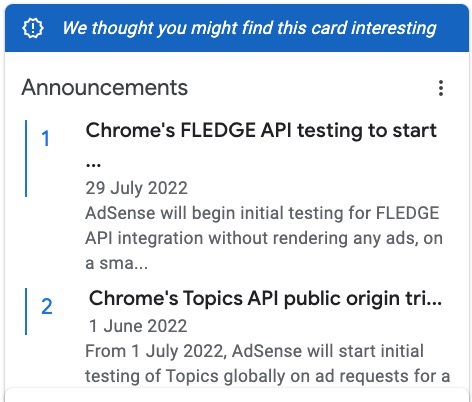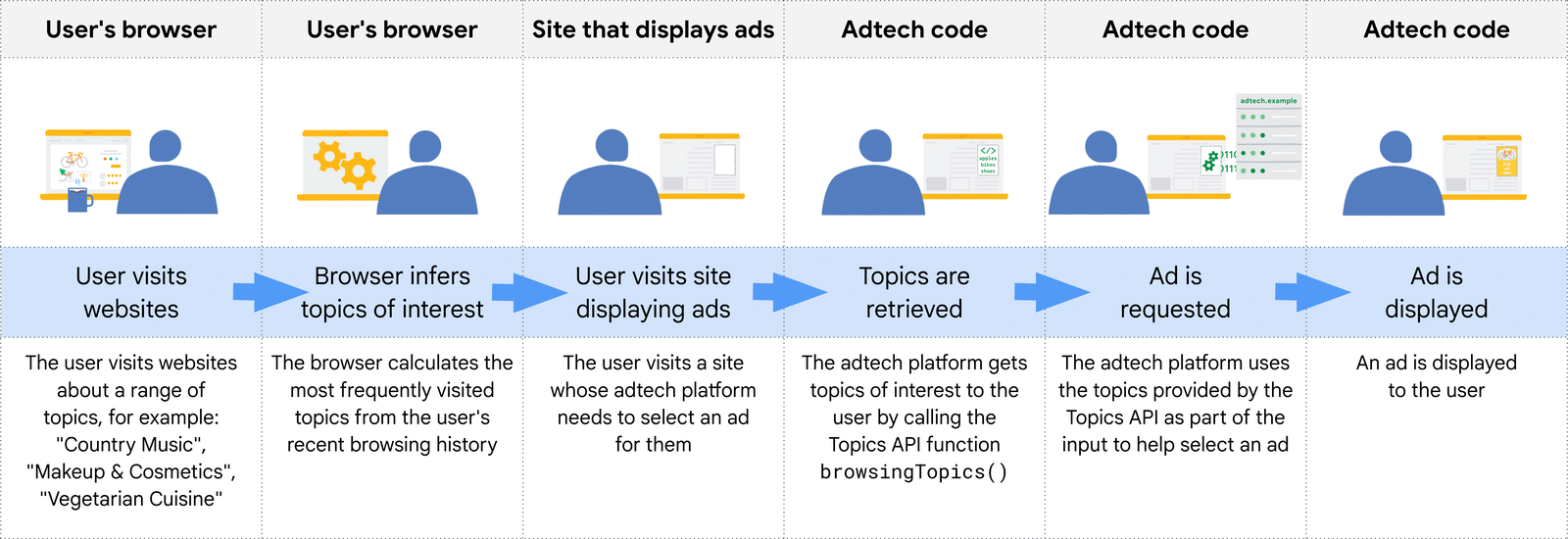
Cookieless, Interest-Based Tracking, No More FLoC?
Google intends to roll out a major new ad targeting system called Topics to replace their Federated Learning of Cohorts (FLoC) proposal.
Let’s talk about how Topics is poised to change the future of online advertising going forward.
Edit as of 4 Aug 2022:
AdSense will begin initial testing for FLEDGE API integration without rendering any ads, on a small percentage of traffic on or after August 28, 2022. Advertisers using Google AdSense to monetize their websites may soon see the initial trail go live, but all of them can opt-out using Chrome's Permissions-policy header.

Before we dive in, let's have a quick look of the differences between Topic API and FLEDGE API: TOPICS API sets the interest group for the user to provide FLEDGE API context for ad bidding.
The Latest FLEDGE Update
In the latest update, Google provided specific FLEDGE features and their timelines for testing availability.
Users can experiment with and participate in the FLEDGE API. Note that not all advertisers are eligible for experimentation at the time of publication
Breaking Down the Topics API
What is The Topics API?
The new Topics API will be used to bridge the gap between internet users that are more privacy-minded than ever before, and advertisers that have long understood some restrictions on the data they collect (and how that data is used) have always been an inevitability.
Topics API will leverage individual browser activity to come up with a handful of topics (general content groups, like Investing, Travel, Sports) that best represent how a person has used the internet over a week span of time.
Right now, there are approximately 350 topics included in the Topics API initial design.
How does Topics API work?
Let's have a look at this picture to understand how would topics be curated and selected:

Here’s how the Topics API works on both the client and server side of things:
Client-Side
- The Topics API will only communicate with domains (and subdomains) that are participants in the Topics API itself. There are no page-level integrations in the API. It is not going to parse content text to analyse page content or assigned topics at that granular level.
- Participating domains and subdomains will receive up to three relevant topics for every eligible visit, one from each of the preceding weeks of data gathered by the Topics API. document.browsingTopics() function will return an array of up to three topics.
- Every week, five top topics are calculated through the Topics API based on browser information, 100% local to that browser (with no external server involvement).
- Whatever topic is returned, the topics will continue to be returned for any caller on that site for the remainder of the three weeks.
- Users have the option to check their topics in the browser setting.
- The browser is in Incognito mode won't return any topic - the topic array will be empty.
Server-Side
- Server-side, the Topics API will provide “callers” with up to three coarse-grained advertising topics based purely off of the browsing history of each individual end-user.
- The topics themselves were repopulated from the unique contextual signals from both the current page as well as the browsing data in aggregate over each individual week span of time.
- Topics themselves are going to be inferred directly by the browser. Classifier models will be used to map hostnames to topics directly, and classifier weightings are going to be 100% public – and may even be constructed by external partners (and are sure to be improved as time goes on).
The Topics explainer proposes that each topic object in the array returned by document.browsingTopics() would have three properties:

What Is A "API Caller"?
A Topics API caller is the entity that calls the document.browsingTopics() JavaScript method, and will use the topics returned by the method to help select relevant ads. Typically, a call to document.browsingTopics() would be from code included in a site from a third party such as an adtech platform. The browser determines the caller from the site of the current document. So, if you're a third party on a page, make sure you call the API from an iframe that your site owns.
In order for document.browsingTopics()to return one or more topics, it must be called in code from the same origin as code that was on a site where those topics were observed.
source: https://developer.chrome.com/docs/privacy-sandbox/topics/

Topics vs FLoC Cookieless Tracking Comparison
There are major differences between the new Topics API and the previous Federated Learning of Cohorts (FLoC) system that was originally introduced by Google in March 2021.
The original push for FLoC bubbled up over the concerns of Google Chrome committing to eliminate third-party cookies by 2023.
Google wanted to improve user privacy, grouping individuals into large cohorts in an effort to provide them with a little extra online anonymity. This move would have significantly improved user privacy – but there was a lot of pushback regarding FLoC from the advertising industry at large.
Google also decided to move away from FLoC after groups like the Electronic Frontier Foundation found that it was possible to “fingerprint” individual users within these cohorts and establish unique identifiers for that user (and their individual browsers).
This almost completely negated the benefits that FLoC was intended to provide without improving the search experience for anyone.
Now, Topics is designed to give a lot more end-user control over:
- How their data is collected
- How their data is stored
- And how their data is shared
Google is currently creating a number of tools for the Chrome browser that will allow end-users to see all of the individual topics that have been connected to their browser history.
Users will have the ability to disable, remove, or prohibit certain topics from connecting to their browser history as well.
There are no current plans in place to allow users to add themselves to different topics (and improve the targeting of advertising on the end-user side of things), but that may be something Google ads later down the line.
The end result is (hopefully) improved privacy for end-users a little more control over personal data, all without making it impossible for advertisers to reach their customers effectively.

Advertisers Have (Reasonable) Concerns About a Topic Focused Future
Advertisers are (understandably) a little bit hesitant to jump on board with Topics just yet.
The biggest concern advertisers have right now is the lack of topic diversity that Google will launch this program.
As of right now (early February 2022), the initial Topic API is intended to launch with right around 350 individual topics. That should be enough topics for most advertisers to get a “broad range” of potential prospects, but it’s not the laser focus or scalpel approach that advertisers are used to.
Online advertisers are nervous about wasting large chunks of their marketing budget on prospects they have little to no chance to convert.
Another concern advertisers have is the limited timeframe of topic connection they are working with.
Depending on browser usage, an individual may only be targeted for a specific topic within a 123 window week of time. Advertisers are looking at something that could be much more directionally accurate than anything else, but that too could improve with time.
Finally, Google’s promise that there’s always a 5% chance that a random topic is returned for each individual browser instance tells advertisers that they may be “pitching to ghosts” from time to time.
This is done in an effort to provide more anonymity and more security. On the flip side, though, it’s going to hurt businesses' conversion rates. There’s no doubt about that.

References
- https://searchengineland.com/google-kills-floc-introduces-topics-api-379120
- https://searchengineland.com/googles-topics-api-advertisers-share-concerns-about-topic-diversity-and-other-potential-challenges-379247
- https://github.com/jkarlin/topics
- https://www.searchenginejournal.com/google-sunsets-floc-announces-new-topics-api-solution/435244/#close
- https://developer.chrome.com/docs/privacy-sandbox/topics/
- https://www.theverge.com/2022/1/25/22900567/google-floc-abandon-topics-api-cookies-tracking
- https://www.adexchanger.com/ad-exchange-news/take-a-deep-breath-and-consider-the-benefits-of-googles-topics-api/
- https://www.adexchanger.com/privacy/meet-topics-api-googles-latest-addition-to-the-privacy-sandbox-its-basically-floc-2-0/
- https://adtechexplained.com/google-topics-api-explained/
- https://blog.google/products/chrome/get-know-new-topics-api-privacy-sandbox/









